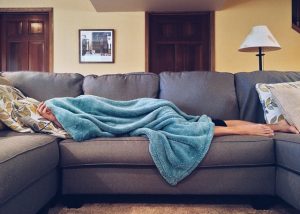Posted on Monday, May 21st, 2018 at 7:58 pm

Sleep deprivation can affect the emotions we feel each day, and it can lead to mental suffering. Low energy levels, negative outlooks, and a lack of motivation are all likely to develop in individuals who do not sleep well. When it’s difficult to stay positive, your outlook on life may not be very optimistic, and mental health can decline. You may not even realize that a genuine lack of sleep is the source of your low feelings.
The human brain enters different stages of sleep over the course of the night, and each one helps the brain recover for the next day. Chronic sleep disturbances are a classic symptom of depression, but the relationship between the two seems to go both ways. Patients can’t sleep because they’re depressed, but studies show that patients may become depressed because they don’t sleep well. Researchers aren’t sure which symptom feeds the other yet, and more work is being done to determine which condition is the chicken and which is the egg.
Small amounts of sleep deprivation over long periods of time have been proven to be harmful to your general mood and may affect your personal relationships with others. Patients who consistently experience sleep issues may exhibit strong symptoms of depression and anxiety. Persistent feelings of sadness, extreme levels of self-doubt, and personal emptiness are symptoms of depression and anxiety caused by sleep deprivation.
The connection between sleep and mood disorders has been documented over several years in both research and medical applications. Patients who are diagnosed with insomnia are nearly ten times more likely to suffer from depression and seventeen times more likely to develop clinical anxiety. Research also indicates that the more frequently a person wakes up during the night, the greater their chances of having depression and anxiety.
Obstructive sleep apnea is a condition that directly affects a person’s quality of sleep by waking them up frequently for brief moments during the night. People who suffer from this condition may not realize that they have obstructive sleep apnea and an observation is usually necessary to be diagnosed with certainty.
Sleep Night Therapy is determined to maximize successful treatment options for patients who suffer from the debilitating effects of sleep-disordered breathing, including obstructive sleep apnea. Dr. Clifford Brown, who leads our Oral Sleep Appliance team, is a trained professional who belongs to The American Academy of Dental Sleep Medicine and The Academy of Clinical Sleep Disorder Disciplines. If you suffer from a lack of sleep, we are determined to help you overcome this issue. Contact our OSA team today to learn how we can help you sleep better by calling (631) 983-2463.